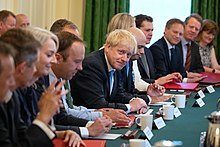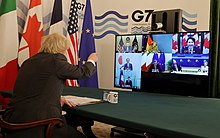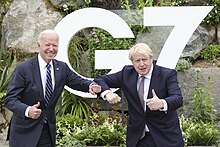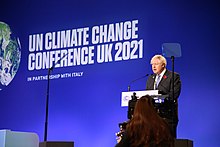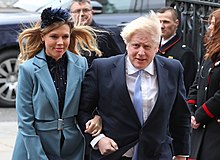Boris Johnson
In his youth Johnson attended Eton College and Balliol College, Oxford, and he was elected president of the Oxford Union in 1986. In 1989 he began writing for The Daily Telegraph, and from 1999 to 2005 he was the editor of The Spectator. He became a member of the Shadow Cabinet of Michael Howard in 2001 before being dismissed over a claim that he had lied about an extramarital affair. After Howard resigned Johnson became a member of David Cameron's Shadow Cabinet. He was elected mayor of London in 2008 and resigned from the House of Commons to focus his attention on the mayoralty. He was re-elected mayor in 2012, but did not run for re-election in 2016. At the 2015 general election he was elected MP for Uxbridge and South Ruislip. Johnson was a prominent figure in the Brexit campaign in the 2016 EU membership referendum. After the referendum Prime Minister Theresa May appointed him foreign secretary. He resigned from the position in 2018 in protest at both the Chequers Agreement and May's approach to Brexit.
Johnson succeeded May as prime minister. He re-opened Brexit negotiations with the EU and in early September he prorogued Parliament; the Supreme Court later ruled the prorogation to have been unlawful. After agreeing to a revised Brexit withdrawal agreement but failing to win parliamentary support, Johnson called a snap general election to be held in December 2019, in which he won a landslide victory. During Johnson's premiership, the government responded to the COVID-19 pandemic by introducing various emergency powers to mitigate its impact and approved a nationwide vaccination programme. He also responded to the Russian invasion of Ukraine by imposing sanctions on Russia and authorising foreign aid and weapons shipments to Ukraine. In the Partygate scandal it was found that numerous parties had been held at 10 Downing Street during national COVID-19 lockdowns, and COVID-19 social distancing laws were breached by 83 individuals, including Johnson, who in April 2022 was issued with a fixed penalty notice. The publishing of the Sue Gray report in May 2022 and a widespread sense of dissatisfaction led in June 2022 to a vote of confidence in his leadership amongst Conservative MPs, which he won. In July 2022, revelations over his appointment of Chris Pincher as deputy chief whip of the party while knowing of allegations of sexual misconduct against him led to a mass resignation of members of his government and to Johnson announcing his resignation as prime minister. He was succeeded as prime minister by Liz Truss, his foreign secretary. He remained in the House of Commons as a backbencher until June 2023, when he received the draft of the Commons Privileges Committee investigation into his conduct that unanimously found that he had lied to the Commons on numerous occasions. Johnson resigned his position as MP the same day.
Johnson is a controversial figure in British politics. His supporters have praised him for being humorous, witty and entertaining, with an appeal reaching beyond traditional Conservative Party voters, viewing him as an electoral asset to the party. Conversely, his critics have accused him of lying, elitism, cronyism and bigotry. During his premiership his supporters praised him for "getting Brexit done", overseeing the UK's COVID-19 vaccination programme, which was amongst the fastest in the world, and being one of the first world leaders to offer humanitarian support to Ukraine following the Russian invasion of the country. His tenure also encompassed several controversies and scandals, and is viewed as the most scandalous premiership of modern times by historians and biographers alike.
Early life and education
Childhood
Alexander Boris de Pfeffel Johnson was born on 19 June 1964 in the Upper East Side of Manhattan, New York City, to Stanley Johnson, then studying economics at Columbia University, and Charlotte Fawcett, an artist, whose father Sir James Fawcett, was a prominent barrister and president of the European Commission of Human Rights from 1972 to 1981. Johnson is one of only two British prime ministers to have been an American citizen . Johnson's parents returned to the UK in September 1964 so Charlotte could study at the University of Oxford. She lived with her son in Summertown, Oxford, and in September 1965 she gave birth to a daughter, Rachel. In July 1965, the family moved to Crouch End in north London, and in February 1966 they relocated to Washington, DC, where Stanley worked with the World Bank. Stanley then took a job with a policy panel on population control, and moved the family to Norwalk, Connecticut, in June. A third child, Leo, was born in September 1967.
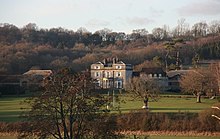
The family returned to the UK in 1969, and lived at West Nethercote Farm, Somerset, Stanley's family home in Exmoor. His father was regularly absent, leaving Johnson to be raised largely by his mother, assisted by au pairs. As a child, Johnson was quiet, studious, and deaf, resulting in several operations to insert grommets into his ears. He and his siblings were encouraged to engage in intellectual activities from a young age. Johnson's earliest recorded ambition was to be "world king". Having no other friends, the siblings became very close.
In late 1969, the family moved to Maida Vale in west London, while Stanley began post-graduate research at the London School of Economics. In 1970 Charlotte and the children briefly returned to Nethercote, where Johnson attended Winsford Village School, before returning to London to settle in Primrose Hill, where they were educated at Primrose Hill Primary School. A fourth child, Joseph, was born in late 1971.
After Stanley secured employment at the European Commission in April 1973, he moved his family to Uccle, Brussels, where Johnson attended the European School, Brussels I and learnt to speak French. Charlotte had a nervous breakdown and was hospitalised with depression, after which Johnson and his siblings were sent back to the UK in 1975 to attend Ashdown House, a preparatory boarding school in East Sussex. There, he developed interests in rugby, Ancient Greek, and Latin. In December 1978 his parents' relationship broke down; they divorced in 1980, and Charlotte moved to Notting Hill, London, where her children joined her for much of their time.
Eton and Oxford: 1977–1987
As a kid I was extremely spotty, extremely nerdy and horribly swotty. My idea of a really good time was to travel across London on the tube to visit the British Museum.
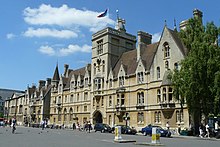
Johnson gained a King's Scholarship to study at Eton College, a boarding school near Windsor, Berkshire. Arriving in the autumn term of 1977, he began going by his middle name Boris, and developed "the eccentric English persona" for which he became famous. He denounced Catholicism and joined the Church of England. School reports complained about his idleness, complacency, and lateness, but he was popular at Eton.
Johnson's friends were largely from the wealthy upper classes; his best friends were Darius Guppy and Charles Spencer. Both would go on to accompany him at the University of Oxford and remained his friends into adulthood. Johnson excelled in English and the Classics, winning prizes in both, and became secretary of the school debating society and editor of the school newspaper. In late 1981 he became a member of Pop, a small, self-selecting elite group of school prefects. After leaving Eton, Johnson went on a gap year to Australia, where he taught English and Latin at Timbertop, an Outward Bound-inspired campus of Geelong Grammar, an independent boarding school.
Johnson won a scholarship to read Literae humaniores at Balliol College, Oxford, a four-year course in Classics, ancient languages, literature, history, and philosophy. Matriculating in late 1983, he was one of a generation of Oxford undergraduates who dominated British politics and media in the early 21st century, including Cameron, William Hague, Michael Gove, Jeremy Hunt and Nick Boles. While at Oxford, Johnson joined the college's rugby union team as a tighthead prop. To his later regret, he joined the Bullingdon Club, an exclusive drinking society notorious for vandalism. Many years later, a group photograph including himself and Cameron in Bullingdon Club formal dress led to much negative press coverage. While at Oxford, he began a relationship with Allegra Mostyn-Owen, cover girl for Tatler magazine and daughter of Christie's Education chairman William Mostyn-Owen. They became engaged.
Johnson was popular and well known at Oxford. Alongside Guppy, he edited the university's satirical magazine Tributary. In 1984, Johnson was elected secretary of the Oxford Union, and campaigned unsuccessfully for the position of Union President. In 1986, Johnson ran successfully for President, but his term was not distinguished or memorable, and questions were raised regarding his competence and seriousness. At graduation, Johnson was awarded an upper second-class degree, and was deeply unhappy he did not receive a first.
Early career
The Times and The Daily Telegraph: 1987–1994
In September 1987, Johnson and Mostyn-Owen married. They settled in West Kensington, London. In late 1987, through family connections, he began work as a graduate trainee at The Times. Scandal erupted when Johnson wrote an article for the newspaper on the archaeological discovery of Edward II's palace, having invented a quote which he falsely attributed to the historian Colin Lucas, his godfather. After the paper's editor, Charles Wilson, learnt of the matter, he dismissed Johnson.
Johnson secured employment on the lead-writing desk of The Daily Telegraph, having met its editor, Max Hastings, while at university. His articles appealed to the newspaper's Conservative-voting "Middle England" readership, and he was known for his distinctive literary style, replete with old-fashioned phrasing and for regularly referring to the readership as "my friends". In early 1989, Johnson was appointed to the newspaper's Brussels bureau to report on the European Commission, remaining in the post until 1994. A strong critic of the integrationist Commission president Jacques Delors, he established himself as one of the city's few Eurosceptic journalists. He wrote articles about euromyths: that Brussels had recruited sniffer dogs to ensure that all manure smelt the same, they were about to dictate the acceptable curve of British bananas, limit the power of their vacuum cleaners and order women to return their old sex toys. He wrote that euro notes made people impotent and that a plan to blow up the Berlaymont building was in place because asbestos cladding made the building too dangerous to inhabit. Many of his fellow journalists were critical of his articles, saying they often contained lies designed to discredit the commission. The Europhile Conservative politician Chris Patten later said that Johnson was "one of the greatest exponents of fake journalism". Johnson opposed banning handguns after the Dunblane school massacre, writing in his column "Nanny is confiscating their toys. It is like one of those vast Indian programmes of compulsory vasectomy."
According to one of his biographers, Sonia Purnell, – who was Johnson's Brussels deputy – he helped make Euroscepticism "an attractive and emotionally resonant cause for the Right", whereas it had been associated previously with the Left. Johnson's articles exacerbated tensions between the Conservative Party's Eurosceptic and Europhile factions. As a result, he earned the mistrust of many party members. His writings were also a key influence on the emergence of the eurosceptic UK Independence Party (UKIP) in the early 1990s. Conrad Black, then proprietor of The Daily Telegraph, said Johnson "was such an effective correspondent for us in Brussels that he greatly influenced British opinion on this country's relations with Europe".
In February 1990 Johnson's wife Allegra broke up with him; after several attempts at reconciliation, their marriage ended in April 1993. He began a relationship with childhood friend Marina Wheeler, who had moved to Brussels in 1990. They were married in May 1993. Soon after, Marina gave birth to a daughter. Johnson and his new wife settled in Islington, north London, an area known for its association with the left-liberal intelligentsia. Under the influence of this milieu and of his wife, Johnson moved in a more liberal direction on issues such as climate change, LGBT rights and race relations. While in Islington, the couple had three more children, all given the surname Johnson-Wheeler. They were sent to the local Canonbury Primary School and then to private secondary schools. Devoting much time to his children, Johnson wrote a book of verse, The Perils of the Pushy Parents: A Cautionary Tale, which was published to largely poor reviews.
Political columnist: 1994–1999
Back in London, Hastings turned down Johnson's request to become a war reporter, instead promoting him to assistant editor and chief political columnist. Johnson's column received praise for being ideologically eclectic and distinctively written, and earned him Commentator of the Year Award at the What the Papers Say awards. Some critics condemned his writing style as bigotry; in columns he used the words "piccaninnies" and "watermelon smiles" when referring to Africans, championed European colonialism in Uganda and referred to gay men as "tank-topped bumboys".
In 1993, Johnson outlined his desire to run as a Conservative in the 1994 European Parliament elections. Andrew Mitchell convinced Major not to veto Johnson's candidacy, but Johnson could not find a constituency. He turned his attention to obtaining a seat in the House of Commons instead. After being rejected as Conservative candidate for Holborn and St. Pancras, he was selected the Conservative candidate for Clwyd South in north Wales, then a Labour Party safe seat. Spending six weeks campaigning, he attained 9,091 votes (23 per cent) in the 1997 general election, losing to Labour candidate Martyn Jones.
Scandal erupted in June 1995 when a recording of a 1990 telephone conversation between Johnson and his friend Darius Guppy was made public. In it, Guppy said that his criminal activities involving insurance fraud were being investigated by News of the World journalist Stuart Collier, and he asked Johnson to provide him with Collier's private address, seeking to have the latter beaten. Johnson agreed, although he expressed concern that he would be associated with the attack. When the phone conversation was published, Johnson stated that ultimately he had not obliged Guppy's request. Hastings reprimanded Johnson but did not dismiss him.
Johnson was given a regular column in The Spectator, sister publication to The Daily Telegraph, which attracted mixed reviews and was often thought rushed. In 1999, he was also given a column reviewing new cars in the American men's monthly magazine GQ. The large number of parking fines that Johnson acquired while testing cars frustrated staff. At The Daily Telegraph and The Spectator, he was consistently late delivering copy, forcing staff to stay late to accommodate him; some related that if they published without his work, he would shout at them with expletives.
Johnson's April 1998 appearance on the BBC's satirical current affairs show Have I Got News for You brought him national fame. He was invited back on to later episodes, including as a guest presenter; for his 2003 appearance, Johnson was nominated for the BAFTA Television Award for Best Entertainment Performance. After these appearances, he came to be recognised on the street, and was invited to appear on other shows, such as Top Gear, Parkinson, Breakfast with Frost, and Question Time.
The Spectator and MP for Henley: 1999–2008
In July 1999, Conrad Black offered Johnson the editorship of The Spectator on the condition he abandon his parliamentary aspirations; Johnson agreed. While retaining The Spectator's traditional right-wing bent, Johnson welcomed contributions from leftist writers and cartoonists. Under Johnson's editorship, the magazine's circulation grew by 10% to 62,000 and it became profitable. His editorship also drew criticism; some opined that under him The Spectator avoided serious issues, while colleagues became annoyed that he was regularly absent from the office, meetings, and events. He gained a reputation as a poor political pundit because of incorrect political predictions. His father-in-law Charles Wheeler and others strongly criticised him for allowing Spectator columnist Taki Theodoracopulos to publish racist and antisemitic language.
Journalist Charlotte Edwardes wrote in The Times in 2019 that Johnson had squeezed her thigh at a private lunch at the Spectator in 1999 and that another woman had told her he had done the same to her. A spokesman denied the allegation.
In 2004, Johnson published an editorial in The Spectator after the murder of Ken Bigley suggesting that Liverpudlians were wallowing in their victim status and "hooked on grief" over the Hillsborough disaster, which Johnson partly blamed on "drunken fans". In an appendix added to a later edition of his 2005 book The Dream of Rome, Tell MAMA and the Muslim Council of Britain criticised Johnson for arguing Islam has caused the Muslim world to be "literally centuries behind" the West.
Becoming an MP
The selection of Boris Johnson ... confirms the Tory Party's increasing weakness for celebrity personalities over the dreary exigencies of politics. Johnson, for all his gifts, is unlikely to grace any future Tory cabinet. Indeed, he is not known for his excessive interest in serious policy matters, and it is hard to see him grubbing away at administrative detail as an obscure, hardworking junior minister for social security. To maintain his funny man reputation he will no doubt find himself refining his Bertie Wooster interpretation to the point where the impersonation becomes the man.
Following Michael Heseltine's retirement, Johnson decided to stand as Conservative candidate for Henley, a Conservative safe seat in Oxfordshire. The local Conservative branch selected him although it was split over Johnson's candidacy. Some thought him amusing and charming while others disliked his flippant attitude and perceived lack of knowledge of the local area. Assisted by his television fame, Johnson won the seat in the 2001 general election. Alongside his Islington home, Johnson bought a farmhouse outside Thame in his new constituency. He regularly attended Henley social events and occasionally wrote for the Henley Standard. His constituency surgeries proved popular, and he joined local campaigns to stop the closure of Townlands Hospital and the local air ambulance.
In Parliament, Johnson was appointed to a standing committee assessing the Proceeds of Crime Bill, but missed many of its meetings. Despite his credentials as a public speaker, his speeches in the House of Commons were widely deemed lacklustre. He attended around half of Commons votes, usually supporting the Conservative party line. In free votes, he demonstrated a more socially liberal attitude, supporting the Gender Recognition Act 2004 and the repeal of Section 28. In 2001 Johnson had spoken out against plans to repeal Section 28, saying it was "Labour's appalling agenda, encouraging the teaching of homosexuality in schools". After initially stating he would not, he supported the government's plans to join the United States in the 2003 invasion of Iraq, and in April 2003 visited occupied Baghdad. In August 2004, he backed unsuccessful impeachment procedures against Prime Minister Tony Blair for "high crimes and misdemeanours" regarding the war, and in December 2006 described the invasion as "a colossal mistake and misadventure".
Although labelling Johnson "ineffably duplicitous" for breaking his promise not to become an MP, Black decided not to dismiss him because he "helped promote the magazine and raise its circulation". Johnson remained editor of The Spectator, while also writing columns for The Daily Telegraph and GQ, and making television appearances. His 2001 book, Friends, Voters, Countrymen: Jottings on the Stump, recounted that year's election campaign, while 2003's Lend Me Your Ears collected previously published columns and articles. In 2004, HarperCollins published his first novel: Seventy-Two Virgins: A Comedy of Errors revolved around the life of a Conservative MP and contained autobiographical elements. Responding to criticism that he was juggling too many jobs, he cited Winston Churchill and Benjamin Disraeli as exemplars who combined political and literary careers. To manage stress, he took up jogging and cycling, and became so well known for the latter that Andrew Gimson suggested he was "perhaps the most famous cyclist in Britain".
Following William Hague's resignation as Conservative leader, the party elected Iain Duncan Smith. Johnson had a strained relationship with Duncan Smith, and The Spectator became critical of his party leadership. Duncan Smith was succeeded by Michael Howard in November 2003; Howard deemed Johnson to be the most popular Conservative politician with the electorate and appointed him vice-chairman of the party, responsible for overseeing its electoral campaign. In his Shadow Cabinet reshuffle of May 2004, Howard appointed Johnson as shadow arts minister. In October, Howard ordered Johnson to apologise publicly in Liverpool for publishing a Spectator article – anonymously written by Simon Heffer – which said the crowds at the Hillsborough disaster had contributed to the incident and that Liverpudlians had a predilection for reliance on the welfare state.
In November 2004, the tabloids revealed that since 2000 Johnson had been having an affair with Spectator columnist Petronella Wyatt, resulting in two abortions. Johnson denied the allegations but they were subsequently proven to be true, and Howard dismissed him as vice-chairman and shadow arts minister when he refused to resign.
Second term


At the 2005 general election, Johnson was re-elected MP for Henley. Labour won the election and Howard stood down as Conservative leader; Johnson backed David Cameron as his successor. After Cameron was elected, he appointed Johnson as the shadow higher education minister. Interested in streamlining university funding, Johnson supported Labour's proposed top-up fees. He campaigned in 2006 to become the Rector of the University of Edinburgh, but his support for top-up fees damaged his campaign, and he came third.
In April 2006, the News of the World alleged that Johnson was having an affair with journalist Anna Fazackerley; the pair did not comment, and shortly afterwards Johnson began employing Fazackerley. In September 2006, Papua New Guinea's High Commission protested after he compared the Conservatives' frequently changing leadership to cannibalism in the country.
In 2005, The Spectator's new chief executive, Andrew Neil, dismissed Johnson as editor. To make up for this loss of income, Johnson negotiated with The Daily Telegraph to raise his salary from £200,000 to £250,000, averaging £5,000 per column. He presented a popular history television show, The Dream of Rome, which was broadcast in January 2006; a book followed in February. A sequel, After Rome, focused on early Islamic history. In 2007 he earned £540,000, making him the third-highest-earning MP that year.
Mayor of London (2008–2016)
Mayoral election: 2007–2008
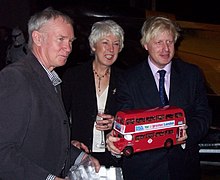
In September, Johnson was selected as the Conservative candidate for Mayor of London after a public London-wide primary. Johnson's campaign focused on reducing youth crime, making public transport safer, and replacing the articulated buses with an updated version of the AEC Routemaster. Targeting the Conservative-leaning suburbs of outer London, it capitalised on perceptions that the Labour Mayoralty had neglected them in favour of inner London. His campaign emphasised his popularity, even among those who opposed his policies, with opponents complaining a common attitude among voters was: "I'm voting for Boris because he is a laugh." The campaign of Labour incumbent Ken Livingstone portrayed Johnson as an out-of-touch toff and bigot.
In the election, Johnson received 43% and Livingstone 37% of first-preference votes; when second-preference votes were added, Johnson was victorious with 53% to Livingstone's 47%. Johnson subsequently announced his intention to stand down as MP for Henley.
First term: 2008–2012
After Johnson became mayor, those in City Hall deemed too closely allied to Livingstone's administration had their employment terminated. Johnson appointed Tim Parker as his deputy mayor, but after Parker began taking increasing control at City Hall, Johnson dismissed him. Many in the Conservative Party initially distanced themselves from Johnson's administration, fearing it would be damaging for the 2010 general election.
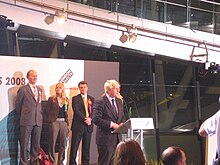
During the campaign, Johnson had confided to Brian Paddick he was unsure how he would maintain his lifestyle on the mayoral salary of £140,000 a year. He agreed to continue his Daily Telegraph column, thus earning a further £250,000 a year. His team believed this would cause controversy and made him promise to donate 20% of his Daily Telegraph salary to a charitable cause. Johnson resented this, and ultimately did not pay the full 20%. Controversy erupted when on the BBC's HARDtalk he referred to the £250,000 salary as "chicken feed"; this was at the time approximately 10 times the average yearly wage for a British worker.
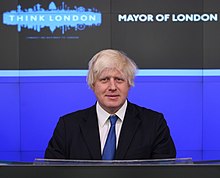
During his first administration, Johnson was embroiled in several personal scandals. After moving to a new house in Islington, he built a shed without obtaining planning permission; after neighbours complained, he dismantled it. The press also accused him of having an affair with Helen Macintyre and of fathering her child, allegations that he did not deny. Johnson was accused of warning Damian Green that police were planning to arrest him; Johnson denied the claims. He was accused of cronyism, in particular for appointing Veronica Wadley as the chair of London's Arts Council. In the parliamentary expenses scandal, he was accused of excessive expenses claims for taxis. Johnson remained a popular figure in London with a strong celebrity status in the city.
Policies
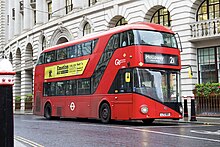
Johnson made no major changes to the mayoral system of the previous administration. However, he did reverse several other measures implemented by Livingstone: ending the city's oil deal with Venezuela, abolishing The Londoner newsletter, and scrapping the half-yearly inspections of black cabs, which was reinstated three years later. Abolishing the western wing of the congestion charging zone, he cancelled plans to increase the congestion charge for four-wheel-drive vehicles. He was subsequently accused of failing to publish an independent report on air pollution commissioned by the Greater London Authority, which revealed the city breached legal limits on nitrogen dioxide levels.
Johnson retained Livingstone projects such as Crossrail and the 2012 Olympic Games, but was accused of trying to take credit for them. He introduced a public bicycle scheme that had been mooted by Livingstone's administration; colloquially known as "Boris Bikes", the part privately financed system was a significant financial loss but proved popular. Despite Johnson's support of cycling, and his much-publicised identity as a cyclist, some cycling groups argued he had failed to make the city's roads safer for cyclists. As per his election pledge, he commissioned the development of the New Routemaster buses for central London. He also ordered the construction of a cable car system that crossed the River Thames between the Greenwich Peninsula and the Royal Docks.
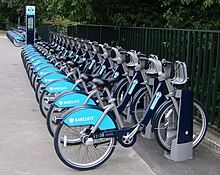
Johnson's first policy initiative was a ban on drinking alcohol on public transport. He announced plans to extend pay-as-you-go Oyster cards to national rail services in London. A pledge in Johnson's manifesto was to retain Tube ticket offices, in opposition to Livingstone's proposal to close up to 40. On 2 July 2008, the Mayor's office announced the closure plan was to be abandoned. On 21 November 2013, Transport for London announced that all London Underground ticket offices would close by 2015. In financing these projects, Johnson's administration borrowed £100 million, while public transport fares were increased by 50%.
During his first term, Johnson was perceived as having moved leftward on certain issues, supporting the London Living Wage and endorsing an amnesty for illegal migrants. He tried placating critics who had deemed him a bigot by appearing at London's gay pride parade and praising ethnic minority newspapers. Johnson broke from the traditional protocol of those in public office not publicly commenting on other nations' elections by endorsing Barack Obama for the 2008 United States presidential election.
Relations with the police, finance, and the media

Johnson appointed himself chair of the Metropolitan Police Authority (MPA), and in October 2008 successfully pushed for the resignation of Metropolitan Police Commissioner Ian Blair, after Blair was criticised for allegedly handing contracts to friends and for his handling of the death of Jean Charles de Menezes. This earned Johnson respect among Conservatives, who interpreted it as his first act of strength. Johnson resigned as chairman of the MPA in January 2010, but throughout his mayoralty was highly supportive of the Metropolitan Police, particularly during the controversy surrounding the death of Ian Tomlinson. Overall crime in London fell during his administration, but his claim that serious youth crime had decreased proved to be false, and he acknowledged the error. He was criticised for his response to the 2011 London riots.

Johnson championed London's financial sector and denounced what he saw as "banker bashing" following the financial crisis of 2007–08, condemning the anti-capitalist Occupy London movement that appeared in 2011. He collected donations from the city's wealthy for a charitable enterprise, the Mayor's Fund, which he had established to aid disadvantaged youths. It initially announced the fund would raise £100 million, but by 2010 it had only earnt £1.5 million. He also maintained extensive personal contacts throughout the British media, which resulted in widespread favourable press coverage of his administration. In turn he remained largely supportive of his friends in the media, including Rupert Murdoch, during the News International phone hacking scandal.
The formation of the Forensic Audit Panel was announced on 8 May 2008. The panel was tasked with monitoring and investigating financial management at the London Development Agency and the Greater London Authority. Johnson's announcement was criticised by Labour for the perceived politicisation of this nominally independent panel. The head of the panel, Patience Wheatcroft, was married to a Conservative councillor and three of the four remaining panel members also had close links to the Conservatives.
Re-election campaign
Up for re-election in 2012, Johnson again hired Crosby to orchestrate his campaign. Before the election, Johnson published Johnson's Life of London, a work of popular history that historian A. N. Wilson characterised as a "coded plea" for votes. Polls suggested that while Livingstone's approach to transport was preferred, voters in London placed greater trust in Johnson on crime and the economy. Johnson's campaign emphasised the accusation that Livingstone was guilty of tax evasion, for which Livingstone called Johnson a "bare-faced liar". Political scientist Andrew Crines believed that Livingstone's campaign focused on criticising Johnson rather than presenting an alternate and progressive vision of London's future. Johnson was re-elected.
Second term: 2012–2016
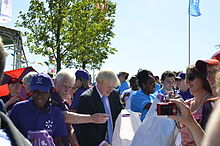
After a successful bid under Livingstone in 2005, London hosted the 2012 Summer Olympics, with Johnson as board co-chair. He improved transportation around London by making more tickets available and adding buses around the capital when thousands of spectators were temporary visitors. Johnson was accused of covering up pollution ahead of the games by deploying dust suppressants to remove air particulates near monitoring stations. In November 2013, Johnson announced major changes to the operation of the London Underground, including the extension of operating hours. All staffed ticket offices were replaced with automated ticketing systems.
Johnson was close friends with American entrepreneur and model Jennifer Arcuri, with The Sunday Times describing him as a regular visitor to her flat, and implying they were in a sexual relationship. Arcuri and her company, Innotech, were awarded substantial government grants, and Johnson intervened to allow her onto three trade mission trips. The Sunday Times said in September 2019 that Johnson failed to declare his personal relationship as a conflict of interest. The Greater London Authority referred the matter to the Independent Office for Police Conduct (IOPC) "so it can assess whether or not it is necessary to investigate the former mayor of London for the criminal offence of misconduct in public office", for the Mayor is also London's police and crime commissioner. On 9 November 2019 it was revealed that the IOPC had decided to publish its report after the general election on 12 December. The IOPC eventually issued its report in May 2020, concluding that, although there was no basis for any criminal charge, there was evidence that the close relationship between Johnson and Arcuri had influenced decisions, that Johnson should have declared an interest, and that his failure to do this could have breached the London Assembly's code of conduct.
In 2015, Johnson criticised then-presidential candidate Donald Trump's false comments that there were no-go zones in London inaccessible for non-Muslims. Johnson said Trump was "betraying a quite stupefying ignorance that makes him frankly unfit to hold the office of President of the United States", becoming the first senior politician in the UK to declare Trump unfit for office, but rejecting calls for him to be banned from the country. In 2016, he said he was "genuinely worried that [Trump] could become president", telling ITV's Tom Bradby that being mistaken for Trump in New York was "one of the worst moments" of his life.
Johnson did not run for a third mayoral and stepped down on 5 May 2016 following the election. A YouGov poll commissioned at the end of Johnson's term revealed that 52% of Londoners believed he did a "good job" while 29% believed he did a "bad job".
Return to Parliament
Johnson initially said that he would not return to the House of Commons while mayor. After much media speculation, in August 2014 he sought selection as the Conservative candidate for the safe seat of Uxbridge and South Ruislip at the 2015 general election. In the 2015 general election, Johnson was elected. There was speculation that he had returned to Parliament because he wanted to replace Cameron as Conservative leader and prime minister.
Brexit campaign: 2015–2016
In February 2016, Johnson endorsed Vote Leave in the "Out" campaign for the 2016 European Union membership referendum. Following this announcement, which was interpreted by financial markets as making Brexit more probable, the pound sterling slumped by nearly 2% against the US dollar, reaching its lowest level since March 2009.
In April 2016, in response to a comment by President Barack Obama that Britain should remain in the European Union, Johnson wrote an "ancestral dislike" of Britain owing to his "part-Kenyan" background may have shaped Obama's views. Several politicians condemned his comments as racist and unacceptable. Conversely, former Conservative Party leader Iain Duncan Smith and UK Independence Party (UKIP) leader Nigel Farage defended them.
Johnson supported Vote Leave's statement that the government was committed to Turkish accession to the EU. Vote Leave was accused of implying that 80 million Turks would come to the UK if it stayed in the EU. When interviewed in January 2019, he said he had not mentioned Turkey during the campaign. On 22 June 2016, Johnson declared 23 June could be "Britain's independence day" in a televised debate.
Following the victory of the "Leave" campaign, Cameron resigned. Johnson was widely regarded as the front-runner to succeed him. Johnson announced he would not stand in the Conservative leadership election. Shortly before this, Michael Gove, hitherto a Johnson ally, concluded that Johnson "cannot provide the leadership or build the team for the task ahead". The Daily Telegraph called Gove's comments "the most spectacular political assassination in a generation". Johnson endorsed Andrea Leadsom's candidature, but she dropped out, leaving Theresa May to be elected uncontested.
Foreign Secretary: 2016–2018

May appointed Johnson foreign secretary in July 2016. Analysts saw the appointment as a tactic to weaken Johnson politically: the new positions of "Brexit secretary" and international trade secretary left the foreign secretary as a figurehead. Johnson's appointment ensured he would often be out of the country and unable to mobilise backbenchers against her, while forcing him to take responsibility for problems caused by withdrawing from the EU.
Some journalists and foreign politicians criticised Johnson's appointment because of his controversial statements about other countries. His tenure attracted criticism from diplomats and foreign policy experts. A number of diplomats, FCO staff and foreign ministers who worked with Johnson compared his leadership unfavourably to previous foreign secretaries for his perceived lack of conviction or substantive positions on foreign policy issues. A senior official in Obama's government suggested Johnson's appointment would push the US further towards Germany at the expense of the Special Relationship with the UK. On one occasion Egyptian president Abdel Fattah el-Sisi walked out of a meeting with Johnson after a meeting did not "get beyond the pleasantries".

Johnson's visit to Turkey in September 2016 was somewhat tense because he had won Douglas Murray's offensive poetry competition about the President of Turkey, Recep Tayyip Erdoğan, four months earlier. When questioned by a journalist whether he would apologise for the poem, Johnson dismissed the matter as "trivia". Johnson pledged to help Turkey join the EU and expressed support for Erdogan's government. Johnson described the Gülen movement as a "cult" and supported Turkey's post-coup purges.
Johnson supported the Saudi Arabian–led intervention in Yemen and refused to block UK arms sales to Saudi Arabia. In September 2016, human rights groups accused him of blocking the UN inquiry into Saudi war crimes in Yemen. Given the UK-Saudi alliance, in December 2016, he attracted attention for commenting the Saudis were akin to the Iranians in "puppeteering and playing proxy wars". In November 2017, Johnson told the Foreign Affairs Select Committee that Nazanin Zaghari-Ratcliffe – a British-Iranian citizen imprisoned in Iran after being arrested for training citizen journalists and bloggers in a BBC World Service Trust project – had been "simply teaching people journalism". Facing criticism, Johnson stated he had been misquoted and that nothing he said had justified Zaghari-Ratcliffe's sentence. In May 2018, Johnson backed the Iran nuclear deal framework, despite Donald Trump's withdrawal.
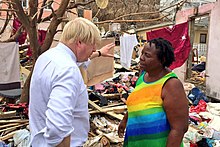
In April 2017, Johnson said that Gibraltar's sovereignty was "not going to change" after Brexit. Johnson promised while in Northern Ireland that Brexit would leave the Irish border "absolutely unchanged". Johnson visited Anguilla and Tortola in September 2017 to confirm the UK's commitment to helping restore British territories devastated by Hurricane Irma. In September 2017, he was criticised for reciting lines from Rudyard Kipling's poem Mandalay while visiting a Myanmar temple; the British ambassador, who was with him, suggested it was "not appropriate". In October 2017, he faced criticism for stating the Libyan city of Sirte could become an economic success like Dubai: "all they have to do is clear the dead bodies away".
Initially favouring a less hostile approach to Russia, Johnson soon backed a more aggressive policy. Following the March 2018 poisoning of Sergei and Yulia Skripal in Salisbury, an act which the UK government blamed on Russia, Johnson compared Vladimir Putin's hosting of the World Cup in Russia to Adolf Hitler's hosting of the Olympic Games in Berlin in 1936. Russia's Foreign Ministry denounced Johnson's "unacceptable and unworthy" parallel towards Russia, a "nation that lost millions of lives in fighting Nazism". Johnson described the Nord Stream 2 gas pipeline from Russia to Germany as "divisive" and a "threat" that left Europe dependent on a "malign Russia" for its energy supplies.
Johnson condemned the persecution of Rohingya Muslims in Myanmar, comparing the situation with the displacement of Palestinians in 1948. Johnson supported the Turkish invasion of northern Syria aimed at ousting the Syrian Kurds from Afrin. He accused the UNHRC of focusing disproportionately on the Israeli–Palestinian conflict and Israel's occupation of the Palestinian territories.

In a September 2017 op-ed, Johnson reiterated the UK would regain control of £350m a week after Brexit, suggesting it go to the National Health Service (NHS). Cabinet colleagues subsequently criticised him for reviving the assertion. Following the 2017 general election, Johnson denied media reports he intended to challenge May's leadership. In a February 2018 letter to May, Johnson suggested that Northern Ireland may have to accept border controls after Brexit and that it would not seriously affect trade, having initially said a hard border would be unthinkable. In June, he was reported as having said "fuck business" when asked about corporate concerns regarding a 'hard' Brexit.
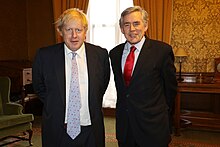
Secret recordings obtained by BuzzFeed News in June 2018 revealed Johnson's dissatisfaction with Prime Minister Theresa May's negotiating style, accusing her of being too collaborative with the European Union in Brexit negotiations. Comparing May's approach to that of the US president Donald Trump – who at the time was engaged in a combative trade war with the EU because it raised tariffs on metal – Johnson said: "Imagine Trump doing Brexit. He'd go in bloody hard ... There'd be all sorts of breakdowns, all sorts of chaos. Everyone would think he'd gone mad. But actually you might get somewhere." He accused individuals of scaremongering over a Brexit "meltdown", saying "No panic. Pro bono publico, no bloody panic. It's going to be all right in the end."
In April 2018, Johnson travelled to Italy to attend a party at the Palazzo Terranova, owned by the former KGB agent Alexander Lebedev and hosted by his son Evgeny. He travelled without security protection or other officials, and did not document the trip, which led to accusations of Johnson having misled parliament. In June 2023, it was revealed that Lord Simon McDonald, the most senior civil servant of his department, was not aware of the trip. Johnson stated that "no government business was discussed" at the event as far as he was aware. Lebedev's villa was monitored by the Italian secret service at the time, who, according to a Channel 4 documentary, suspected it to be used for espionage activities. Johnson granted a peerage to Evgeny in 2020, against the advice of the MI6, and met with criticism over potential security concerns.
In July 2018, three days after the cabinet had its meeting to agree on a Brexit strategy, Johnson, along with Brexit secretary David Davis, resigned his post.
Return to the backbenches: 2018–2019
Johnson returned to the role of a backbench MP. In July, he delivered a resignation speech, stating "it is not too late to save Brexit". In January 2019, Johnson came under criticism for remarks he had made during the 2016 Leave campaign regarding the prospect of Turkish accession to the European Union; he denied making such remarks. In March 2019, he was criticized for saying that expenditure on investigating historic allegations of child abuse was money "spaffed up the wall".
Journalism
In July 2018, Johnson signed a 12‑month contract to write articles for the Telegraph Media Group. The Advisory Committee on Business Appointments (ACOBA) reported that this was a breach of the Ministerial Code. Johnson was ordered to apologise for failing to declare £50,000 of earnings. The Parliamentary Commissioner for Standards found the errors were not inadvertent, and that Johnson had failed on nine occasions to make declarations within the rules.
In September 2018, Johnson wrote: "We have opened ourselves to perpetual political blackmail. We have wrapped a suicide vest around the British constitution – and handed the detonator to Michel Barnier." Senior Tories heavily criticised him, with Alan Duncan of the Foreign Office vowing to ensure the comments marked "the political end of Boris Johnson". In April 2019, the Independent Press Standards Organisation ruled that a claim in a 6 January 2019 article in The Daily Telegraph, "The British people won't be scared into backing a woeful Brexit deal nobody voted for", authored by Johnson, that a no-deal Brexit was "by some margin preferred by the British public" was false, and "represented a failure to take care over the accuracy of the article in breach of Clause 1 (i)" of its guidelines, and required that a correction be published.
2019 Conservative Party leadership election

On 12 June 2019, Johnson launched his campaign for the Conservative Party leadership election, saying, "we must leave the EU on 31 October." On the campaign trail, Johnson warned of "catastrophic consequences for voter trust in politics" if the government pushed the EU for further delays. He advocated removing the backstop from any Brexit deal. On 25 and 26 August, he announced plans to retain £7 or £9 billion of the £39 billion divorce payment the UK is due to transfer to the EU upon withdrawal. Johnson initially pledged to cut income tax for earners of more than £50,000 but backed away from this plan in June 2019 after coming under criticism in a televised BBC debate.
Johnson was elected leader with 92,153 votes (66%) to Hunt's 46,656 (34%).


